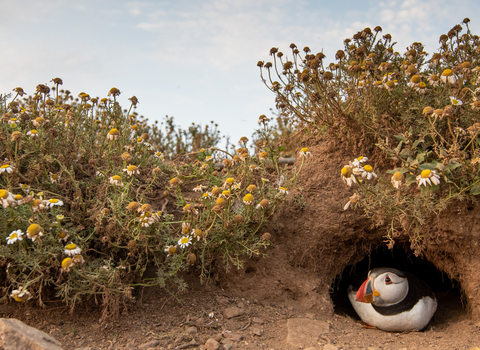As a Special Protection Area (SPA) and Wales' only Marine Conservation Zone (MCZ), the sea around Skomer is of huge importance to so many precious species. WTSWW's team of conservation experts, in partnership with local agencies, are now taking action to limit the potentially dire consequences of this wreckage.
As an MCZ, the waters around Skomer are of national and international importance to species including Atlantic Grey Seals, Bottlenose Dolphins, and Eelgrass. Skomer MCZ has byelaws, under nature conservation legislation, which limit the disturbance of wildlife, whilst specific fishery byelaws also prohibit certain activities, such as the use of mobile fishing gear. The boat which wrecked on Tuesday is a locally owned 16m fishing boat which frequented the waters around Skomer. Despite the calm conditions of early Tuesday morning, it appears that the boat came into trouble and struck a rock on the south side of the island.
Unfortunately, shortly before the wreckage, the boat was refueled to its 3,000-litre capacity of diesel. Aerial surveillance from an HM Coastguard plane shows that there is no surface level pollution from the incident, meaning that it is unlikely that any oil entered the marine environment where the boat wrecked. Upon the boat’s removal, the fuel was extracted to make the vessel lighter, and it is believed that no fuel had been lost as a result of the shipwreck. It is very fortunate that this event did not pollute the MCZ, but the risks for the island remain…
As an internationally important seabird breeding colony, Skomer is essential to Manx Shearwaters, Lesser Black Backed Gulls, Puffins, and several other species. One of the reasons why these populations thrive on Skomer – one of only a few colonies in the world which has seen an increase in numbers over recent years – is due to the lack of any significant ground predators. This continued absence is key to the future conservation of seabirds and other ground-nesting birds. The introduction of a new species such as rats, or even other, smaller rodents, poses the greatest risk to the islands. Neighboring island, Ramsey, where rats arrived via shipwrecks and pushed the Puffins from the island, is testament to the damage that can be caused. WTSWW staff are undertaking all possible measures to ensure that Tuesday’s wreckage does not have similar consequences.
Lisa Morgan, Head of Islands and Marine, says… “The fishing vessel that struck Skomer has now been removed from the island’s south coast where she ran aground on the night of 7 December. Of greater concern now is the possibility that rats could have come ashore from the stricken boat. Rats could have a devastating impact on the burrow-nesting birds on Skomer Island if a population were to become established. Skomer is unmanned over winter, but our staff are preparing to travel back to the Island in the next 24 hours to deal with this emergency. We will also be liaising with the local authorities and the MCA to understand how this could have happened, despite the calm conditions last night.”
A shipwreck constitutes the highest level of risk in the Skomer SPA risk assessment, similar in urgency to a rat sighting, and means that WTSWW’s island team are now undertaking the strictest of protocols to reduce the possibility of rat infestation from the wreck. This means setting traps every 50m within a 500m radius of the wreck and checking them twice a day for 5 days, whilst also undertaking surveillance from trail cameras, and the pre-established ‘surveillance stations’. Great care is taken by the WTSWW’s team to ensure that this monitoring does not negatively impact any wildlife on the island, with the exception of potential rats.
With assistance from MCZ, HM Coastguards, Pembrokeshire County Council, and Biosecurity For LIFE, WTSWW hope to ensure that the impacts of Tuesday’s shipwreck are behind them by the time the first ground nesting seabirds, The Manx Shearwaters , arrive in March. Biosecurity is an essential part of conservation and a risk which cannot be taken with Skomer’s significant seabird populations.

